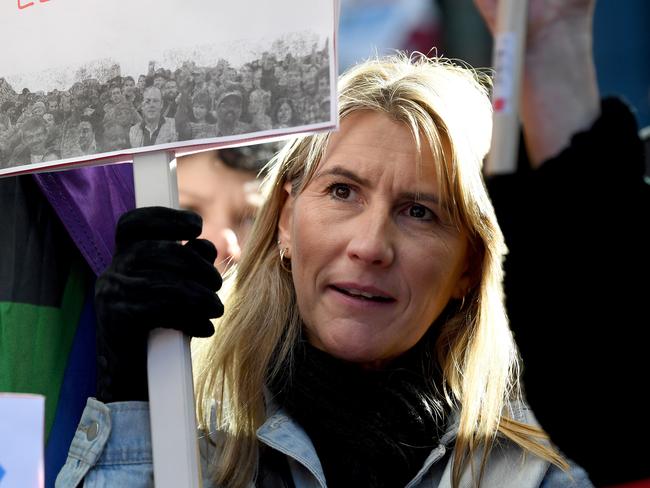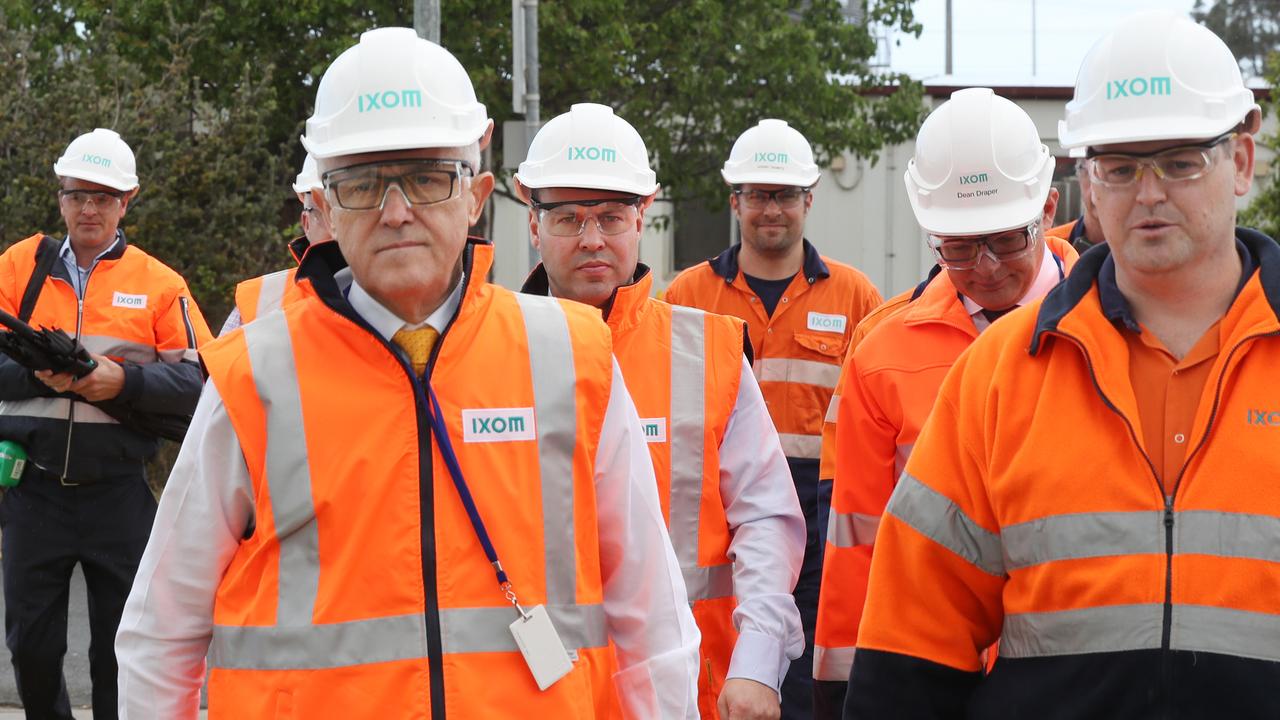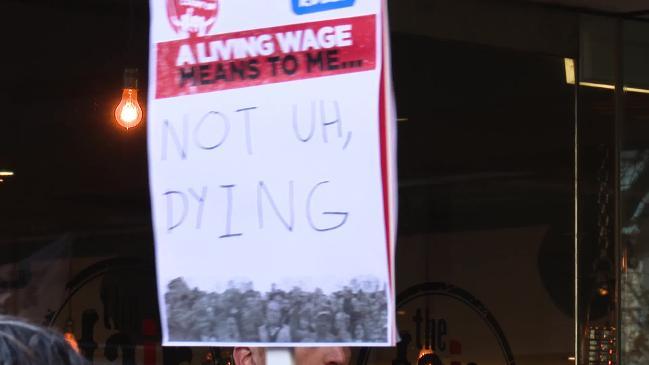Are Australians entitled to whinge about low wage growth?
THE economy is improving and Aussies are working harder than ever. But many workers still aren’t getting pay rises. Here’s why.

LOW wage growth has become a hot topic in Australia and looks set to be a big issue at the federal election but are we all really grumbling about nothing?
Australian Financial Review editor-in-chief Michael Stutchbury appears to think so.
“There is a lot of whingeing around about there’s no wages growth,” Mr Stutchbury said during an appearance on Insiders on Sunday.
“Wages haven’t fallen, they’ve kept ticking along.”
Average wages have continued to grow and are keeping pace with inflation, so is Mr Stutchbury right, are we expecting too much? Are Australians just whingeing?
‘THERE’S GENUINE CONCERN’
The average real wage is growing but Dr Timo Henckel of the ANU Research School of Economics said he had “genuine concern” about the low rate of growth.
He said growth in real wages was “fairly flat” at 0.1 to 0.4 per cent (depending on which statistics you use) and this is because the growth in nominal wages was about 2 per cent, only slightly higher than the inflation rate of 1.9 per cent.
“One might argue that Australian workers are not very productive and as a consequence shouldn’t expect wage growth but that’s not the truth,” Dr Henckel said.
“Productivity has been outstripping real wage growth quite substantially for about 15 years.”
So if productivity has increased but wage growth has not kept up, then that “gap” is going to business profits.
“Workers aren’t getting their share of the increase to the economic pie,” Dr Henckel said.
“For anyone who cares about inequality that’s clearly a problem.
“It’s something that other countries are experiencing as well but not to the same degree.”
Last week the Federal Government revealed a 1 per cent growth in GDP and while welcoming the outcome, Opposition finance spokesman Jim Chalmers said the figures also highlighted why people were unhappy.
“In these numbers we saw today, and one of the reasons why people are not necessarily happy out there in Middle Australia, is because profits in this country are growing five times faster than wages — five times faster than wages, profits are growing in this country!
“That means that people, no matter how hard they work, they’re not necessarily getting ahead; they’re not spending in the economy, that number for consumption was very weak; the wages number was very weak; and people have got high household debt.”
"Are you seriously saying people who are uncomfortable with their wage growth are whingers?", asks @farrm51, as the Insiders panel discuss the impact of wage growth. #Insiders #auspol @barriecassidy @annabelcrabb pic.twitter.com/sNVRW0daGU
— Insiders ABC (@InsidersABC) June 10, 2018
Australia Institute chief economist Richard Denniss said the unemployment benefit hadn’t risen in real terms in 20 years.
“So to suggest that those people who lost their jobs when the car industry left our shores are ‘whingeing’ when they point out that the unemployment benefit is intolerably low, is ridiculous,” he told news.com.au. “They’re entitled to whinge.”
THE TRUTH ABOUT THE ‘AVERAGE WAGE’
Mr Denniss said the “average wage” figure was meaningless when trying to work out how well people were doing.
“If you have five people and they each have a coffee, then ‘on average’ they’ve each got one coffee. But if one person has five coffees and others have none, then ‘on average’ they’ve still got one coffee each,” Mr Denniss told news.com.au.
Importantly, while numbers for average wage increases give us the impression that Australians are staying ahead of inflation, some people will be doing it much tougher as their pay rises would have been lower.
A more meaningful way to look at the issue is to compare growth in different segments of society.
“We know for example, that the minimum wage hasn’t grown nearly as fast as wages for those in the top 10 per cent,” Mr Denniss said.
Those on the minimum wage got a 3.5 per cent boost recently, but in the previous three years their payments only increased by about 5.8 per cent between 2015 and 2017, from $656.90 a week to $694.90 a week, according to Trading Economics.
This is much lower than the generous increases chief executive officers have enjoyed.
Corporate adviser Conrad Liveris has analysed salary and total renumeration for the average ASX100 CEO and found they had increased by 9.6 per cent (from $1.4 million a year, to $1.6 million) between 2015 and 2017, although salaries did dip slightly in 2016 to $1.2 million.
If you take into account bonuses and other incentives, total remuneration rose from $3.43 million a year to $4.7 million — that’s a staggering 37 per cent increase — compared to 5.8 per cent for minimum wage workers.
Mr Liveris told news.com.au that huge salaries for CEOs began in the 1980s and 1990s when some businesses needed to attract foreign executives to take up high profile positions in Australia.
“They demanded high remuneration, especially salaries, because back then Australia was a ‘hardship-posting’ as communication and travel wasn’t as easy back then,” he said.

“This saw massive income increases and starting salaries for these executives — for some it was as high as 20 per cent income increase each year — but for most it was around 10 per cent.
“This has embedded a culture of high pay in executive ranks that remains today.”
Mr Liveris said the only reversal to these high salaries happens when executives leave and new people are brought in on lower salaries.
“Executive remuneration doesn’t get the scrutiny it deserves from companies,” he said.
“The attitude ‘that’s the way we have always done it’, remains strong and limits any substantial adjustments that could improve performance and is better in line with shareholder and community expectations.”
SHOULDN’T WE JUST BE PATIENT?
There has been a gradual improvement in wages growth and RBA governor Philip Lowe expects more going forward.
The government has promised income tax cuts to ease cost of living pressures on Australians but Dr Henckel said while these would help for a couple of years, it wouldn’t really improve income inequality and would eventually benefit higher income earners more.
The government has also linked wage growth to a strong economy and believes its plan to cut company tax will help.
“What I want to see is businesses to be able to pay their employees more and they are not going to be able to do that if they are kept on a high-tax island,” Treasurer Scott Morrison said earlier this year.
“I don’t think you are going to get a wage increase in a business that is paying high taxes.”
But a secret survey conducted by the Business Council of Australia found most chief executives didn’t intend to use the tax cut to increase wages or employ more staff, the AFR reported.
More than 80 per cent said they would probably use the extra money to boost returns to shareholders or invest in the company.
Mr Denniss said Treasury modelling found the vast benefit of the tax cuts would flow to the owners of foreign companies.
“The question is, of all the things we want to spend hundreds of millions on, which one will create the most jobs?
“The government is arguing tax cuts are the best way to create jobs in Australia, I disagree entirely. It’s hard to see how anyone could argue that spending the same amount of money building schools and public transport, wouldn’t create far more jobs.”
Mr Denniss said he didn’t think company tax cuts would help make lives easier for those doing it tough or to improve inequality.
“The government seems to be arguing that the last 27 years of economic growth didn’t help the poor, but the next three will,” he said.
“It sounds like the triumph of hope over experience. A simple way to help those at the very bottom would be to increase unemployment benefits and the minimum wage.
“It’s interesting to point out, the same people who say they can’t afford to increase unemployment benefits, are saying we must spend tens of millions on tax cuts.”

NEW ‘SOCIAL COMPACT’ NEEDED
Dr Henckel believes there should be a proper debate and reshaping of the relationship between businesses and workers, which he believes is too adversarial.
In Germany, he said firms with a minimum of 500 workers must appoint employees to a supervisory council so automatically it’s not management against workers.
“(Workers) have some say in how the firm operates, how the income of the firm and dividends are distributed.”
Dr Henckel said a new “social compact” between businesses and workers should be created.
“We need to ensure workers have bargaining power and they get their fair share of productivity gains,” he added.
Email: charis.chang@news.com.au | Twitter: @charischang2





